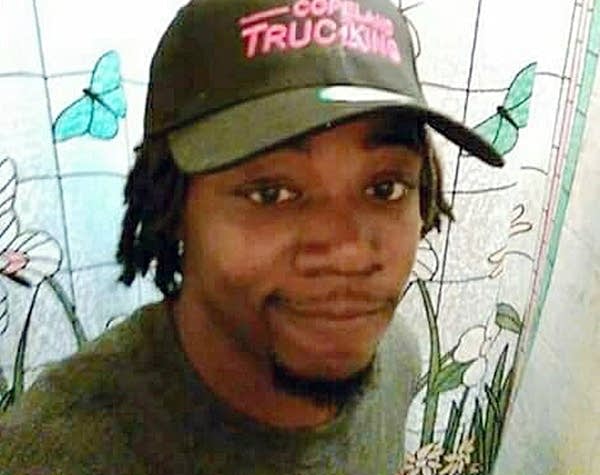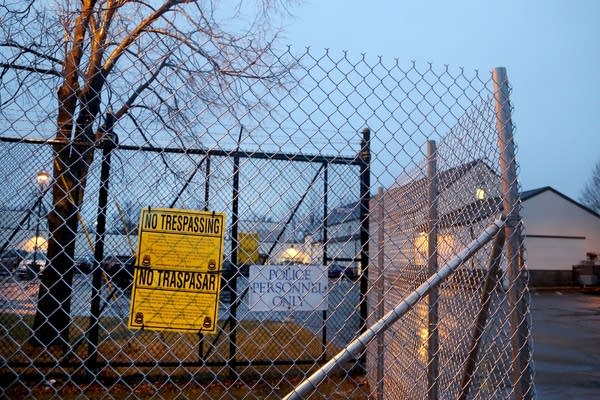Prosecutor won't charge cops in Jamar Clark shooting

Like this?
Log in to share your opinion with MPR News and add it to your profile.
Like this?
Thanks for liking this story! We have added it to a list of your favorite stories.
Updated 5:35 p.m. | Posted 10:50 a.m.

Hennepin County Attorney Mike Freeman said Wednesday that the use of force by two Minneapolis police officers was justified in the Nov. 15 shooting death of Jamar Clark and that prosecutors will not press charges against them.
Freeman said there was no physical evidence that Clark had been handcuffed at the time he was shot — a key question in the matter.
Support the News you Need
Gifts from individuals keep MPR News accessible to all - free of paywalls and barriers.
He also said Clark's DNA was found on the gun and duty belt of one of the officers, which backed up the officers' account that Clark had reached for the weapon during the struggle.
Clark, 24, was shot during a confrontation with police in north Minneapolis on Nov. 15. Officers had been told he was interfering with a paramedic crew treating his girlfriend outside a late-night birthday party.

Conflicting accounts in the shooting's aftermath about whether or not Clark, a black man, was handcuffed rocked the Twin Cities for months, reopening racial tensions between police and African-Americans and triggering widespread protests. For several weeks, demonstrators remained outside the 4th Precinct police station in north Minneapolis.
The two officers — Dustin Schwarze and Mark Ringgenberg — are veteran officers who had been on the Minneapolis force a little more than a year before the shooting.
Freeman on Wednesday said Schwarze was the officer who shot Clark.
In a sometimes riveting narrative, Freeman described how the chaotic scene unfolded.

Paramedics had responded to a call for medical help at the party. According to Freeman, they found Clark's girlfriend, RayAnn Hayes, 41, in the apartment building where the party was being held, intoxicated and with abrasions and a split lip. Freeman said the two had fought and "several people saw Hayes slam Clark's head into a door."
Paramedics carried her down the stairs and outside the building, where Clark was waiting. "That's the guy who did this to me," Freeman quoted the woman as saying.
According to Freeman, an agitated Clark began cursing at one of the paramedics. The paramedics locked themselves and their patient inside the ambulance and called for help.
In a fateful twist, the ambulance's new security features did not allow a paramedic to simply move from the back to the front to drive away and would have had to go outside the unit to get in the driver's seat.
The result: "The paramedics could not leave for the hospital because the driver was locked in the back" over safety concerns outside, Freeman said.

Officers Schwarze and Ringgenberg arrived shortly after. Freeman said at 12:49 a.m., officers approached Clark and told him to take his hands out of his pockets, but he refused. Ringgenberg pulled out his gun but kept it down, Freeman added.
"What's the pistol for?" Clark allegedly called out.
Freeman said that Ringgenberg then holstered his weapon and he and Schwarze grabbed Clark to handcuff him, but couldn't. Ringgenberg then used a take down maneuver — reaching his arm around Clark's chest and neck — and took him to the ground.
Ringgenberg landed on his side on top of Clark, who was on his back. As he tried to roll over to handcuff Clark, Riggenberg said he "felt his gun go from his right hip to the small of his back and called out to Schwarze, 'He's got my gun,'" Freeman recounted.
Schwarze put his gun to the edge of Clark's mouth and said, "'Let go or I'm going to shoot you,'" Freeman said.
At that point, according to Freeman's account, Clark told the officers, "I'm ready to die."

Freeman said Schwarze's gun did not fire initially because the gun slide was only partly pulled back. He pulled the trigger again and shot Clark.
The entire confrontation took 61 seconds after the police approached, Freeman said.
The autopsy on Clark, he added, showed a blood alcohol level of .09, slightly above the legal driving limit, as well as the presence of THC, the active ingredient in marijuana.
Freeman concluded the officers feared for their lives and their actions were reasonable given the situation.
Clark supporters immediately cast doubt on the prosecutor's account of what happened and accused Freeman of placing too much emphasis on the officers' telling of events and not enough on the testimony of those in the neighborhood where the shooting happened. Others dismissed the narrative as "propaganda."
"We are leaving here with more questions than answers," Minneapolis NAACP President Nekima Levy-Pounds told Freeman during the press conference, where she continued to describe the police shooting as murder.
"We will not rest until we get justice," she said.
"Our job is not to have them have the last word. We can still win this thing if we don't quit," activist Mel Reeves told protesters at a late afternoon rally in Minneapolis. "Not only did not they not give us justice, they disrespected us."

The officers remain on non-enforcement duties in the department and it's not clear when that will change, Minneapolis Police Chief Janee Harteau said Wednesday.
The department is also conducting an internal review that will look at the tactics used by officers that night, including the take down on Jamar Clark, she said.
The officers followed procedure and training protocols, said Lt. Bob Kroll, head of the Minneapolis police officers union.
"They felt terrible about it since it happened" but now have some relief, Kroll added.
Minneapolis officials have called on the United States Justice Department to review the case for any civil rights violations. That inquiry continues, a point Minnesota DFL U.S. Rep. Keith Ellison made.
"This decision to decline charges does not absolve our broken criminal justice system," Ellison said in a statement. "It does not foreclose federal action or civil action for violation of Jamar Clark's civil rights."
In order to bring criminal charges, prosecutors would have to prove beyond a reasonable doubt that police use of force was not justified, Freeman said.
To get a charge of second-degree manslaughter, Freeman said the evidence would have to prove the officers were "grossly negligent."
Officials remained concerned about the public reaction to the charging decision and have been appealing for calm.
Harteau last week posted a videotaped message warning activists that authorities wouldn't tolerate violence. That drew a response from activists, saying they would not tolerate police brutality.
Protesters are expected to rally later today. There were scattered reports of people demonstrating peacefully in north Minneapolis this afternoon.
Freeman told reporters after his presentation that to him "the definitive evidence" was the DNA on the gun. "Nothing scares a cop more than somebody trying to take their gun."
Reflecting on the fact the entire confrontation took just over a minute, Freeman said, "If Clark had taken his hands out of his pockets he'd be alive today."





